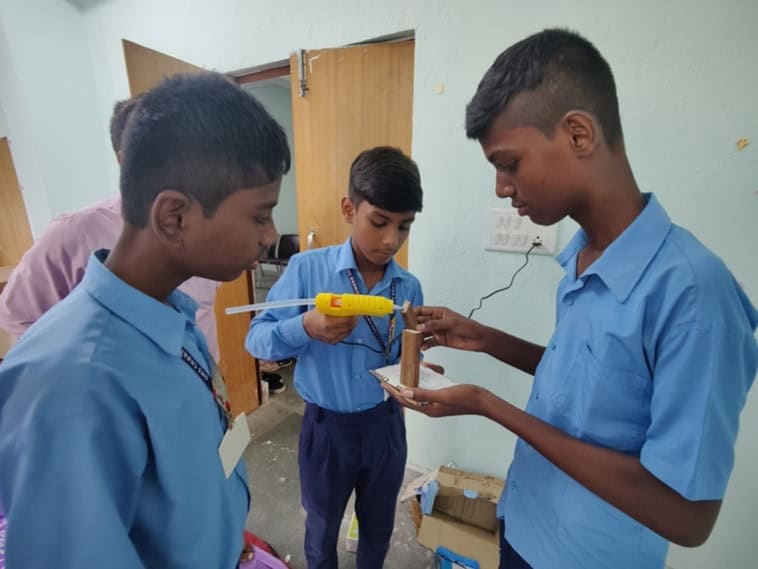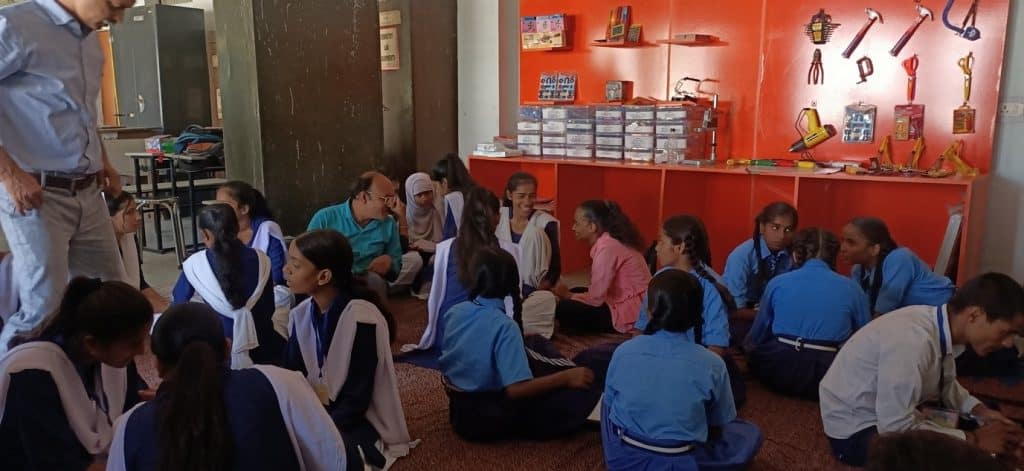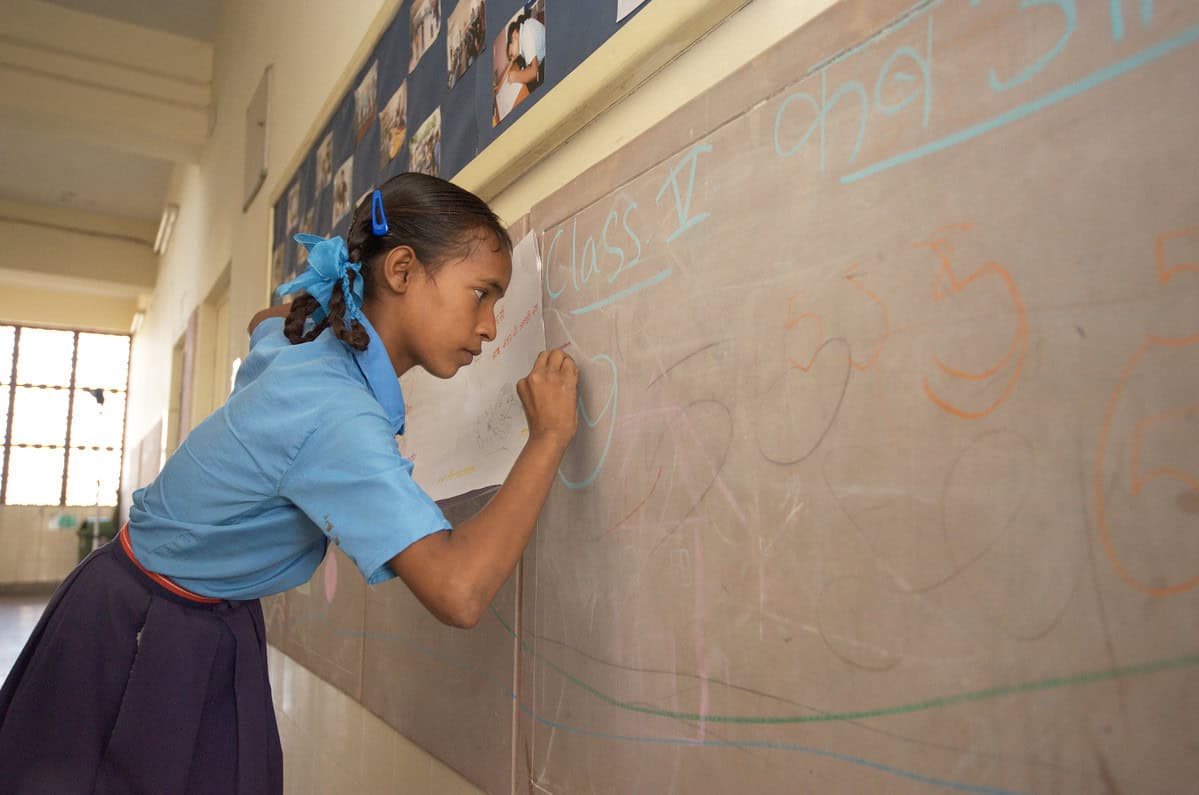The Indian Government’s National Education Policy 2020 marks a pivotal shift in national efforts towards cultivating scientific temperament and 21st-century skills among students. One standout government initiative is the Atal Tinkering Lab, which has successfully spurred interest in experimentation, STEM education, and critical thinking in many metropolitan schools across the country. However, Bihar – with its vast and diverse educational landscape – has seen only a handful of such initiatives. To bridge this gap, local teachers and the Schools2030 team in India, have introduced the ‘Growth Labs’ initiative in Bihar, bringing innovative educational opportunities to a broader spectrum of schools in the state.

Addressing the gap: Hands-on learning for future innovators
In the schools supported by the Schools2030 programme, educators pinpointed a significant gap: the need to engage students in hands-on science and engineering activities. These activities are crucial for encouraging curiosity and peer learning, which are fundamental for developing essential problem-solving skills. Teachers across elementary and secondary schools voiced a strong desire to create spaces where students could collaborate, brainstorm, and turn ideas into practical solutions, laying the groundwork for the Growth Labs initiative.
How it works: Supporting students through practical exploration
In 2023, Schools2030 supported the launch of Growth Labs in 17 schools spread across five districts—Muzaffarpur, Samastipur, Bhojpur, Patna, and Saran. Targeting students aged 15 and above, the initiative also includes two schools for those aged 10 and above. These labs are equipped with a rich array of tools and materials, from art and craft supplies and hardware, to microscopes, chemicals, and electrical devices. These resources motivate students to prototype solutions to real-world problems encountered in their schools and communities.
Ujjwal Kumar, a student at Senior Secondary Palnga, Phulwari Patna Bihar identified a problem at home and used the Growth Labs to create a solution. Rainy days are particularly challenging for Ujjwal’s family; whenever it suddenly rained, his mother would rush to save the clothes drying on the roof, but they often got wet before she could reach them. Using materials like sensors, lights, mini bulbs, and other tools, Ujjwal developed a special sensor that sounded an alarm when a few drops of rain fell on it, alerting his mother in time. Ujjwal’s small invention became a big relief for his family and has inspired him to create more innovations to make people’s lives easier.
“Growth Lab innovation is allowing me to think
Ujjwal Kumar, Class 9th Senior Secondary Palnga, Phulwari Patna, Bihar
about problems that every parent faces, but no one
addresses. This has empowered me to think critically and
create low-cost innovations. It’s been incredibly helpful,
allowing me to connect more with science-related challenges
and learn through interesting and hands-on experiences.”
Nandani Kumari, a student at Manav Baijnath +2 School in Bhojpur, Bihar came up with an innovative solution to tackle the build up of discarded single-use polythene bags and damaged roads in her community. With help from her fellow students, Nandani collected the single-use polythene bags and mixed them with small stones and sand. Together, they used this mixture to fill the potholes near the school, ensuring the safety of their fellow students. This environmentally friendly approach not only addressed the immediate issue of potholes but also helped in managing plastic waste, showcasing Nandini’s innovative thinking and leadership skills.
“My small experiment could help to reduce the
Nandani Kumari, Class 10th Manav Baijnath +2 School, Bhojpur, Bihar
accumulation of polythene waste, and she hopes that
discarded polythene might be utilized in road construction.
This experiment has filled her with confidence, and she has
resolved to continue creating new inventions and
conducting experiments that can make people’s lives
easier.”
So far, the programme team has successfully set up the labs and initiated the first round of activities, familiarising students with the lab equipment. Through orientation sessions, both students and teachers are taught how to manage, use, and maintain the labs, adopting a shared responsibility approach. Teachers also receive training on understanding the significance of this initiative and their critical role in its facilitation. Subsequent plans include integrating Growth Lab sessions into the regular curriculum, with teachers leading the activities and project work.

A promising future: Transforming education in Bihar
The introduction of Growth Labs has sparked excitement and curiosity among students and teachers alike. These labs have enhanced teachers’ ability to demonstrate complex scientific and mathematical concepts, making learning more interactive and practical. Students have been shown to be enthusiastic about creating the prototypes, applying classroom knowledge to real-world scenarios. Many schools have now allocated specific periods for Growth Lab activities, particularly for students in Grades 9-10, ensuring they engage in these enriching activities at least once a week, thus honing their 21st-century skills.
The Growth Labs initiative has already ignited a renewed interest in studies among students and teachers. Schools with Growth Labs have reported higher student engagement, particularly in lab sessions, reflecting a positive shift in attitudes towards learning. In the current Human-Centred Design (HCD) cycle, the success of this initiative has motivated other schools to enhance their Growth Labs and bolster teachers’ capacity to engage students in similar activities. This approach is poised to effectively address challenges such as student attendance and learning outcomes.
The Growth Labs initiative by Schools2030 India takes a ground-breaking step towards enhancing scientific and 21st-century skills education in Bihar. By equipping students with the tools and environment to experiment and innovate, these labs are nurturing the next generation of thinkers and problem-solvers. As the project continues to evolve, it holds the promise of transforming education in the region, fostering a culture of curiosity, creativity, and collaboration. Here’s to a brighter, innovative future for Bihar’s students!

